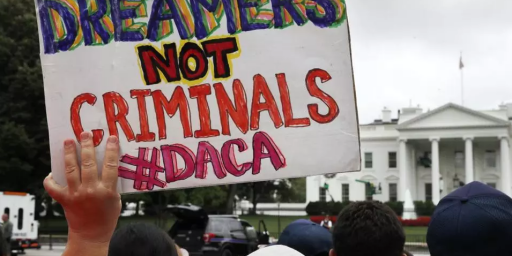Bill Backer, Creator Of ‘I’d Like To Buy The World A Coke’ Ad, Dies At 89
Bill Backer, the man behind the creation of the most famous commercials of the 1970s if not all time, has died at the age of 89:
Bill Backer, a lapsed lyricist whose classic 1971 commercial taught a fractious world of potential Coca-Cola consumers to sing in perfect harmony and was featured in the finale of “Mad Men,” died on Friday in Warrenton, Va. He was 89.
His death was confirmed by his wife and only immediate survivor, the former Ann Mudge.
Mr. Backer and his team immortalized jingles and slogans that proclaimed “Things go better with Coke” and defined the soft drink as “the real thing”; declared that Miller Lite was “everything you ever wanted in a beer… and less”; elevated the Campbell’s brand by asserting that “soup is good food”; and allowed that “little girls have pretty curls, but I like Oreo.”
He also anointed the break devoted to beer drinking as “Miller Time,” reserved festive occasions for Löwenbräu (“Here’s to good friends, tonight is kind of special”), and created advertising campaigns for Fisher-Price, Hyundai cars, Parliament cigarettes, Philip Morris, Quaker Foods and Xerox.
But Mr. Backer had no illusions about what collaboration he would be remembered for, as he told The New York Times in 1993 when he was about to retire as vice chairman and worldwide creative director of Backer Spielvogel Bates after a four-decade career in advertising.
“Nobody out there has heard of J. Walter Thompson or Backer Spielvogel Bates,” he said. “Those are temporal, self-aggrandizing entities. But if you come up with what’s basically a little hymn to getting the world together, it’s a contribution.”
His little hymn, “I’d Like to Teach the World to Sing (in Perfect Harmony),” became a memorable commercial for Coca-Cola, a hit record, the inspiration for a sequel Super Bowl advertisement in 1991 and a coda for “Mad Men” on AMC last year, when Don Draper, the series’ protagonist, meditating at a spiritual retreat in California, conjured up the original 1971 utopian vision of apple trees and honeybees and snow white turtledoves, which prompted a youthful multicultural chorus on an Italian hilltop to want “to buy the world a Coke and keep it company.”
Matthew Weiner, the creator of “Mad Men,” was quoted as describing the series finale as “a love letter for a brand.”
Mr. Backer’s own epiphany behind what became known as the hilltop commercial was not quite as blissful.
According to his account in a company-sponsored video, he was on his way to London in January 1971 to meet with the songwriters Billy Davis and Roger Cook when his flight was diverted by fog to Shannon Airport in Ireland.
The next morning, Mr. Backer was stunned to see the diverse group of passengers who had been angry the night before cheerfully conversing in the coffee shop.
“People from all over the world, forced by circumstance, were having a Coke — or a cup of coffee or tea — together,” he wrote in his 1993 book, “The Care and Feeding of Ideas.” “They were making eye contact over a Coke, and they were keeping each other company.”
“That was the basic idea,” he wrote: “to see Coke not as it was originally designed to be — a liquid refresher — but as a tiny bit of commonality between all peoples.”
By the time he flew to Liverpool and was bused to fog-shrouded London, he recalled: “I could see and hear a song that treated the whole world as if it were a person — a person the singer would like to help and get to know. I’m not sure how the lyric should start, but I know the last line.”
On a paper napkin, he had scribbled, “I’d like to buy the world a Coke and keep it company.”
(…)
William Montague Backer was born in Manhattan on June 9, 1926, to William Bryant Backer, a real estate developer, and the former Ferdinanda Legare. His father died when he was 6, and he moved with his mother to her native South Carolina.
He wrote musical comedies in high school, served in the Navy and graduated from Yale in 1950. He hoped to become a songwriter but was persuaded by his mother and stepfather, Dr. Joseph I. Waring, to go into a more legitimate business, like real estate, which he did briefly.
He then started a jingle business before leaving for Columbia Pictures, but was so critical of the commercials being produced there that he was fired. His boss suggested an ad agency.
In 1953, he went to work in the mailroom at McCann Erickson. He was named creative director in 1972 and vice chairman in 1978. A year later, he and Carl Spielvogel, a former advertising columnist for The Times and an executive at McCann’s owner, Interpublic, formed their own agency.
By 1984, Backer & Spielvogel was billing more than $400 million a year. In 1986, it was bought by the British company Saatchi & Saatchi for a reported down payment of $56 million, with $45 million more paid over six years, and merged with Ted Bates Worldwide.
Not bad at all, I’d say.
Here’s the commercial that made Backer’s career:
And here he is talking about how he came up with this idea in a company video:
And, finally, the final moments of Mad Men:





I’m rather fond of the Koch Brothers parody – “The Evil Thing”
https://www.youtube.com/watch?v=MbykzqJ6ens
I dug the way the finale of Mad Men used ‘I’d Like To Buy The World A Coke’ as a false redemption for Draper, a man it turned out was irredeemable. This bereft, alone, shattered man saw what was in front of him and co-opted and usurped that hippie idealism for professional success. A sell-able image of amity and unity was more important than the real thing.
I have to re-watch from the beginning, but at the time, I scanned the first bit of Mad Men as a paean to a lost era of caddish men in retro-snappy suits, but that was also how it was being sold at the time and so I could have been missing the obvious subtext. I don’t know if this was Weiner’s intent from the beginning, but it quite quickly morphed into an examination of women in America during that time period, what they faced, how they reacted to what they faced, and whether that turned out to work or not and how that then impacted and informed their lives.
Mad Men was ultimately about the women. Maybe that was Weiner’s goal from the start. I’m not even sure that Draper was ultimately the anti-hero – I think that may very well have turned out to be Peggy.
Joan and Betty were the bridge characters with one foot in the old era and one in the new. Peggy was the initial avatar of the new age. Then Sally (my golly, what an amazing actress that young woman is.) Then layer on the visuals, that Raise The Red Lantern – era Zhang Yimou symmetry paired with North by Northwest starkness. (Sorry, that got a bit film-geeky, time to reel it in.)
Back to the topic, Draper is at his most bereft, his most vulnerable. He has just seen himself in another broken man and embraced him fully. His next conscious act is to use that experience for professional success because, like he has always believed, professional success will magically invoke that elusive wholeness and happiness that he has never truly known. He has hit rock bottom and then discovered the pitch for the The Perfect Iconic Ad. We see the full Coke ad. Roll credits.
I call that an apt ending. YMMV.
—
BTW, Doug, I’m not criticizing you for this – you were just quoting the original article. After the Mad Men finale I found myself humming and singing this for the next two or three weeks. It’s a total earworm of a song. Now, it’s restarted on constant loop in my brain. Grr!